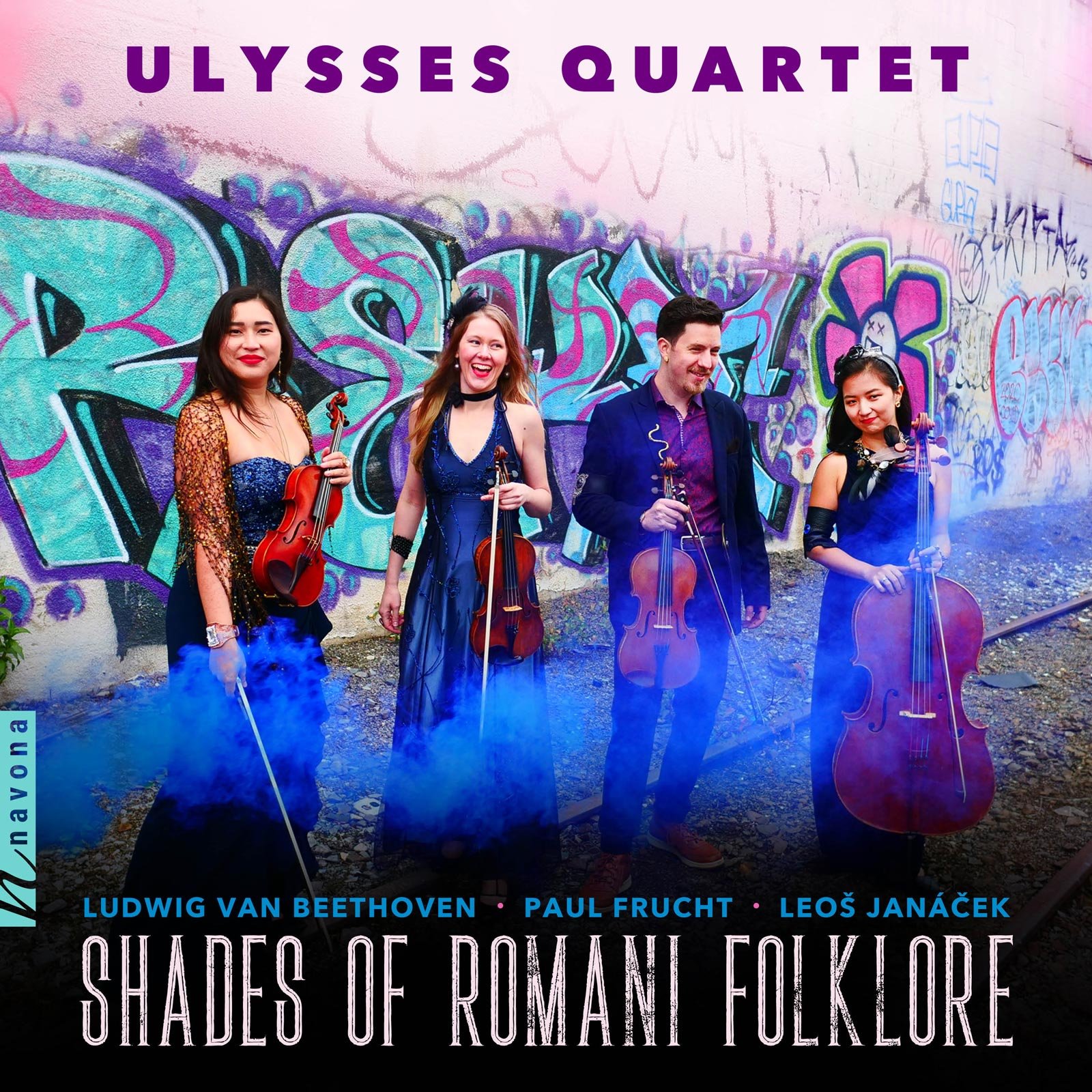Track Listing
String Quartet In C Minor, Op. 18 No. 4
Ludwig van Beethoven
I. Allegro ma non tanto (8:21)
II. Andante scherzoso quasi allegretto (7:23)
III. Menuetto: Allegretto (3:23)
IV. Allegro – Prestissimo (4:18)
Rhapsody (11:17)
Paul Frucht (b. 1989)
String Quartet No. 2, “Intimate Letters”
Leoš Janáček
I. Andante - Con moto - Allegro (6:12)
II. Adagio - Vivace (6:12)
III. Moderato - Andante - Adagio (5:19)
IV. Allegro - Andante - Adagio (7:45)
Notes
The thread that connects the seemingly contrasting works on this album is the influence of the rich and vibrant tradition of Romani music-making. Each composer drew on this wellspring of inspiration in a unique way, creating music that is deeply personal yet informed by Romani style and spirit.
Paul Frucht’s Rhapsody was inspired by Maurice Ravel’s Tzigane, a masterpiece of musical exoticism written for the Hungarian violin virtuoso Jelly d’Arányi that evoked the Romani style. Frucht uses the inventiveness of Tzigane as a jumping-off point, incorporating elements of jazz and other jazz-influenced popular American idioms.
Op. 18 No. 4 of Beethoven takes the listener through their emotional paces, laying the foundation for the profound breadth of his later works—at turns tempestuous, tender, and tongue-in-cheek. The piece culminates in a rip-roaring finale with a distinct Romani flavor to its rondo theme.
In contrast to the early Beethoven, “Intimate Letters” is one of Janáček’s most mature and powerful works, representing his tumultuous and mysterious relationship with the much younger Kamila Stösslová. In one of the hundreds of letters he wrote to her, Janáček admitted to Kamila that he had cast her in the role of Zefka, a Roma girl whose forbidden love affair with a Czech youth forms the basis of his song cycle The Diary of One Who Disappeared. Though Kamila’s own correspondence was destroyed at her request, her specter haunts the piece in the form of Janáček’s tormented, obsessive passion and the full spectrum of raw emotion on display.
—Notes by Rhiannon Banerdt
Music Video
Credits
Recorded January 8–10, 2020 at Veronica Hagman Hall in Danbury, CT
Recording Session Producer & Engineer: Sheldon Steiger
Photography: Lara St. John
Styling: Milica Paranosic
Executive Producer: Bob Lord
A&R Director: Brandon MacNeil
VP of Production: Jan Košulič
Audio Director: Lucas Paquette
VP, Design & Marketing: Brett Picknell
Art Director: Ryan Harrison
Design: Edward A. Fleming
Publicity: Kacie Brown & Gail Wein
Ulysses Quartet
The Ulysses Quartet has been praised for their “textural versatility,” “grave beauty” and “the kind of chemistry many quartets long for, but rarely achieve” (The Strad).
Founded in the summer of 2015, the group won grand prize and gold medal in the 2016 Fischoff National Chamber Music Competition, first prize in the 2017 American Prize, 2018 Schoenfeld International String Competition, 2019 Vietnam International Music Competition, and second prize in the 2017 Osaka International Chamber Music Competition.
The quartet’s members hail from Canada, the United States and Taiwan. They have performed in such prestigious halls as Carnegie Hall, Wigmore Hall, Harbin Grand Theatre, Jordan Hall, and the Taiwan National Recital Hall. Other notable engagements include CMS Lincoln Center, Basel Kammermusik, Sociedad Filarmónica de Bilbao, Fundación Juan March, Premiere Performances Hong Kong, National Arts Centre, Sociedad Filarmonica de Lima, Música UNAM in Mexico City and Teatro Mayor Julio Mario Santo Domingo. Ulysses were the Lisa Arnhold Fellows at Juilliard from 2019 to 2022, the school’s Graduate Resident String Quartet.
The Ulysses Quartet has a non-profit foundation which believes intensely in the power of music to inspire, enlighten and bring people together. Ulysses aims to use this platform to raise the voices of underrepresented BIPOC and female composers.
The members of Ulysses hold degrees from the Juilliard School, Manhattan School of Music, New England Conservatory, Boston Conservatory and University of North Texas. The musicians perform on instruments and bows graciously on loan from the Maestro Foundation and private donors. Ulysses is grateful for the support of Shar Music and Connolly Music as YSOA ambassadors.
